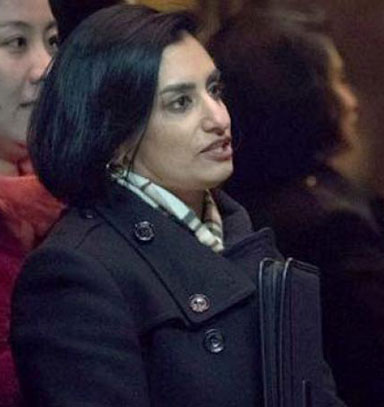 WASHINGTON: US President-elect Donald Trump has nominated an Indian-American woman to a top administration position, making her in charge of a federal agency within the US Department of Health and Human Services.
WASHINGTON: US President-elect Donald Trump has nominated an Indian-American woman to a top administration position, making her in charge of a federal agency within the US Department of Health and Human Services.
“I am pleased to nominate (Dr) Seema Verma to serve as Administrator of the Centers for Medicare and Medicaid Services,” Trump said in a statement.
The announcement came along with Trump’s nomination of Congressman Tom Price as his Health and Human Services Secretary.
A leading expert in the country on Medicare and Medicaid, Verma would serve as Administrator of Centers for Medicare and Medicaid Services.
“She has decades of experience advising on Medicare and Medicaid policy and helping states navigate our complicated systems. Together, Chairman Price and Seema Verma are the dream team that will transform our healthcare system for the benefit of all Americans,” Trump said.
“I am honored to be nominated by President-elect Trump today,” said Verma, who met Trump in New York last week. “I look forward to helping him tackle our nation’s daunting healthcare problems in a responsible and sustainable way,” she said.
Verma currently is the President, CEO and founder of SVC, Inc, a national health policy consulting company.
Based in Indianapolis, Verma has supported Indiana through development of the historic program since its inception in 2007, from development of the enabling legislation, negotiating the financing plan with the state’s hospital association, developing the federal waiver, supporting federal negotiations and leading the implementation of the program, including the operational design.
For more than 20 years, she has worked extensively on a variety of policy and strategic projects involving Medicaid, insurance, and public health, working with Governors’ offices, state medicaid agencies, state health departments, state departments of insurance, as well as the federal government, private companies and foundations.
“Verma has extensive experience redesigning Medicaid programs in several states. Verma is the architect of the Healthy Indiana Plan (HIP), the nation’s first consumer directed Medicaid program under Governor Mitch Daniels of Indiana and then-Governor Pence’s HIP 2.0 waiver proposal,” said the presidential transition team.
Verma received her Master’s degree in Public Health, with a concentration in health policy and management from Johns Hopkins University, and her Bachelor’s degree in Life Sciences from the University of Maryland.
She served as the state of Indiana’s health reform lead following the passage of Obamacare in 2010.
Republicans praised her nomination, but supporters of the current health care law were less pleased. They oppose requirements that poor people pay for medical care, which is included in the Medicaid policy adopted in Indiana and is up for consideration by other Republican-led states.
“We’re really concerned,” said Judith Solomon, vice president for health policy at the liberal Center for Budget and Policy Priorities.
Prior to Pence, Verma was a consultant to former Republican Indiana Gov. Mitch Daniels, who pushed for a precursor to Pence’s current Medicaid plan.
Her firm, SVC Inc., has been paid more than $6.6 million by the state of Indiana since 2011 for her consulting work, according to records.
In a 2008 blog post on the website HealthAffairs, co-authored with a Daniels’ administration official, Verma outlined a philosophy that “melds two themes of American society that typically collide in our health care system, rugged individualism and the Judeo Christian ethic.”
Indiana’s Medicaid program “combines these diametrically opposed themes by promoting personal responsibility while providing subsidized health protection to those who can least afford it,” she wrote.
The nomination, if approved, would give Verma a significant voice in the policies Trump’s presidential administration chooses to pursue if he makes good on a campaign promise to repeal and replace the ACA.
Under Pence, Indiana accepted federal money made available for low-income heath care under Obama’s law. But the state only took the money after the Obama administration agreed to an added twist: requiring poor people to pay nominal fees for the care they receive. Those who don’t keep up on monthly payments, which can be as low as $4, aren’t eligible for as many services.
In most states, the poor are not required to pay such fees. The Indiana program has extended health care benefits to more than 300,000 people in the state.
In Kentucky, where Verma consulted for Republican Gov. Matt Bevin, the state has requested federal permission to require people on the state’s Medicaid plan to pay monthly premiums, have a job or volunteer for a charity to remain eligible for health benefits.
Pence has said that requiring the poor to make payments for Medicaid means they are taking personal responsibility and have “skin in the game.”
But some Republicans in his home state disagreed. Republican Indiana state Rep. Ed Clere, former chairman of a health care committee in the state’s General Assembly, said requirements other than fees, such as quitting smoking or taking steps to improve personal health, also demonstrate “personal responsibility” and could be more cost effective in the long run.
“In my experience there was an unwillingness to expand the conversation beyond financial participation,” Clere said.-PTI, AP






